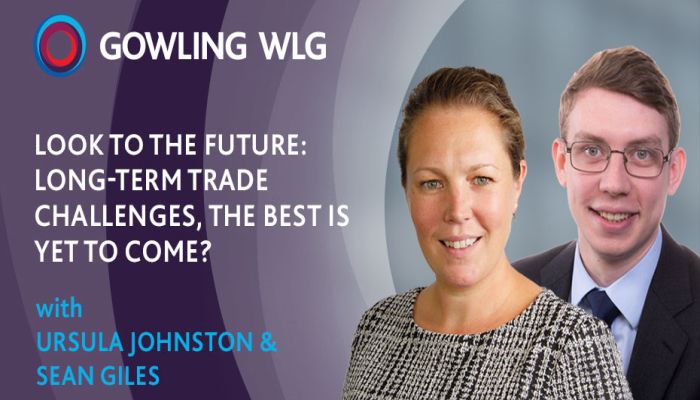With Brexit negotiations on hold for the UK election, our team looks beyond short-term political uncertainty. We highlight the key international trade risks for your business, and practical tips for maximising opportunities in the medium-long term.

To listen the audio click here
Transcript
Ursula Johnston: Hi, good morning. I am Ursula Johnston
Sean Giles: And I am Sean Giles.
Ursula: And we're from the Gowling WLG EU, Trade and Competition Team. So, this morning in the rain shadow of the up and coming general election, we thought we would talk about something that is close to our hearts - trade. In particular, we want to think about life beyond Brexit and what might be the longer term challenges for UK and global traders as they look to grow and cement their manufacturing and distribution supply chains.
Let us have a little challenge, let us try and not mention Brexit in the whole of the podcast.
Sean: Excellent, because my first question to you was going to mention Brexit so now it is going to be difficult but I can still do it.
Ursula: Okay, it is a challenge, let us talk about trade without talking about Brexit.
Sean: Okay.
Ursula. Okay, so we thought we would think about trade from the internal perspective of a business - so operationally and then talk about some of the macro level considerations. Thinking about our clients and our contacts, what is the first longer term challenge for businesses operating in the UK and beyond?
Sean: I think definitely one thing that we have seen in context of the political turmoil that is nothing to do with the word we won't mention is that a lot of businesses just don't have that internal knowledge there. The understanding of trade, the customs and compliance just isn't there because for so long the UK hasn't had to do it.
Ursula: Yeah.
Sean: I mean now businesses are more aware of what is going on and that is something that needs to be developed and leveraged as the UK leaves
Ursula: Don't say it!
Sean: The EU trading bloc.
Ursula: We work quite frequently with our counterparts in the Netherlands and I look at who has knowledge about freight and trade, customs duties procedures, in the most part that sits in the Netherlands and Belgium and certainly that has been my experience. Even looking at customs and trades as a profession, it is so much more advanced on that side of the channel and I think the UK will catch-up - we have to catch-up - but that is going to take some time and as we have seen, there is becoming a bit of a scramble for talent and now businesses are really thinking about how can they invest in training up existing resources because in the absence of finding someone in the market they're going to have to use somebody internally who is already from a logistics or a supply chain function. There are some great training courses out there for those people but actually what I think is that trade and customs becomes quite business specific. Particularly at an operational level.So those companies are going to have to really think about how they are going to tailor their training courses for what they're actually going to need that person to do.
Sean: And I suppose that is challenge one - having the knowledge and the people to do the work.
Ursula: Yes.
Sean: Going beyond that, so once you've kind of got your people, you've got your team, what do you think in terms of integrating that within the business and making it work for the business more than just to deal with an immediate challenge, what do you think are the steps businesses should be taking?
Ursula: Yeah, and that is a really good point because over the last two years as we have been talking from our perspective as a law firm to clients, is saying trade should be on the agenda for a range of functions that could be procurement, logistics, legal, finance, tax - so trade touches every part of an organisation - even HR. We're talking to companies now about hiring processes, how does sanction law potentially impact those processes and screening requirements? But let us think about, in those long-term challenges, procurement strategy because undoubtedly the UK and Europe and all those countries are looking to globalise and mobilise - they are thinking about what trade deals they can strike. Where can we open, where can we get better market access, where can we lower the cost of doing business. Companies should be able to take advantage of these trade agreements but actually it is quite complicated and we're certainly talking to businesses about how do they bake in trade strategy into decisions about procurement strategy.
Sean: Yeah and there may be more to it than just, the UK has a free trade agreement with X country so let us go procure stuff from X country because there could be non-tariff barriers there could be additional regulatory costs and that jurisdiction that may be hidden if you just look at a free-trade agreement level.
Ursula: And potentially, actually the cost of trying to comply with rules of origin, preferential rules of origin, obtaining long-term suppliers declaration, to demonstrate you've bought goods from a particular country. Actually the cost and the hassle of doing that may not be outweighed by the duty cost. Duties are generally, bar a few sectors, generally quite low so I think the first step when we're looking at trade in a procurement strategy is to build a methodology by which you can take decisions based on a business case, save as a cost benefit.
Ursula: What is the cost of not doing something and what is the cost of doing something proactive. We have to remember that businesses tend to not be particularly agile in switching procurement. That could be for a whole range of reasons but it is not as simple as saying, oh we have suddenly got a EU simple FTA, why don't I start procuring widgets from Singapore, for example, it is not a quick decision and it is not a quick process to start changing the way that you go out into the market and procure and purchase.
Ursula: And then thirdly, the other challenge that we see operationally for managing trade, but I think particularly in the long-term as supply chains become more complex and businesses want to leverage those trade deals is, do you have the systems and infrastructure in place to try and automate a lot of this.
Sean: Yeah, and if you don't have those systems, then currently you have to go out and find them and you have to find a system that works, exisitingsystems that will talk to one another and again that is an additional cost and time cost as well. So thinking of long-term challenges I suppose you want to be on the front foot so that when the UK negotiates free-trade agreements, you have the system in place already to identify what the potential benefits are and the potential dis-benefits.
Ursula: Yeah, absolutely and we are now in a position where big, large organisations can essentially decide to cut out their customs broker by adopting software that actually sends customs declarations direct to the customs authorities. So you could see for large traders in the UK that have significant cross-border trade with the EU that at some point that one-off capital investment will start to pay off because you will be able to cut-out your broker fees which can be £40, £50, £60 per declaration.
Sean: Yeah and then you can get into trying new things like blockchain, which I am not even going to attempt to talk about because it is very complicated and it is one of those words that everything thinks they know but I don't think anyone actually knows.
Ursula: It is just a distributed ledger.
Sean: But that is a genuine way of tracking an item through its entire life essentially and then you can see how that would have an obvious application within a supply chain and cross-border movements and tariff and non-tariff costs attract.
Ursula: Absolutely and there is a number of pilots? So, I know, for example, in the US that Walmart is working with a number of their suppliers, particularly in the agricultural sector to give better traceability over products that consumers buy and that is not so much around facilitating cost-border trade but actually in that particular case it is giving consumers visibility over where their products have come from and also more importantly possibly is in the case that something goes wrong with those products or they're diseased that you can actually trace them back to the source and prevent wider outbreak.
But I don't think we're going to be looking at blockchain as a solution for managing cost-border trade and customs processes for at least another decade.
Shall we just move onto some of the more macro considerations around long-term challenges? So as a firm we have been looking at protectionism and what is the impact of that on global trade. When we talk about protectionism, so you have on the one hand governments looking to increase tariff and non-tariff barriers to protect domestic markets and then you have, on the other hand, globalisation where you have, I think the EU is a good example of going out and continually looking at how they can increase market access with training partners.
Ursula: You recently wrote an article I think on a really great example of a recent non-tariff protectionist measure?
Sean: It was a podcast which I am sure my avid followers would have listened to - all two of them - my Mum and Dad. Yeah, so it is quite interesting to see on the non-tariff barrier side, a lot of countries are now introducing foreign direct investment screening. We talked previously about the UK proposing to introduce a foreign direct investment screening regime in the Queen's speech. Similarly, Japan just last week, had introduced a new law that changes their foreign direct investment scheme to effectively make it risk based but also slightly more strict and I thought it was interesting that part of their reasoning for doing so., The Japanese government had stated that if you looked across the G7, every country - actually apart from the UK - has some kind of foreign direct investment screening in place. So if we see countries coming together that are supposed to be the globalisers, those in favour of free trade coming together to be more collectively protectionist of a weird environment where those that are supposed to be going out negotiating free trade agreements with one another, promoting reasonable free trade agreements on the one hand are, on the other hand, protecting domestic industries there is a tension there - notwithstanding the US/China headwind of the trade war so I think there is something for businesses to traverse but also to stay up to date with what is going on. Not get exposed.
Ursula: Yes absolutely and I think that segues really nicely that idea of globalism. I read a short interview with Pascal Lamy - the said former director general of the WTO and he was asked where do you think EU trade policy is falling short? And one of his comments, I found really interesting was, yes, the EU has gone and made a lot of bilateral trade deals that actually where it is falling short is looking at bigger regional trade deals? I think a really great example of that is the EU/Singapore trade agreement which came online last week.
So on the one hand, I think it took over seven years to negotiate. It is comprehensive, so it is not just looking at tariffs but it is looking at access to theservices market as well, IP protection, financial services etc. but I know that the hope is that this becomes a springboard for a broader EU/ ASEAN so the Association of South-Sast [Asian Nations to get an agreement between the EU and those members, which is about 13 but surely it would have been much more ambitious and interesting and much more valuable had the EU just tried to go down that route in the first place of making a trade deal with ASEAN because businesses from manufacturers, EU manufacturers - getting market access into places like Indonesia and Philippines of growing middle classes - that's where the value would have been.
Sean: I suppose you can see that similarly in South and Central America where the EU is in the process of negotiating a regional free trading agreement with MERCUSORand that negotiation has been going on for over ten years now while at the same time we have mini-deals I suppose with countries like - Peru, Columbia - these kind of Andean nations coming together with an EU Andean nation agreement rather than it being focussing on that larger regional piece but taking these small deals - maybe using those as a bridge for a regional EU to other trading partner negotiation.
Ursula: But what are the challenges that the UK is going to face potentially 2020 and beyond? And it is going to be do we want to strike a trade deal with the US because that may well limit our ability to negotiate trade deals with other parties so that is going to be something that I think plays out quite quickly. I think the UK is going to have to put a stake in the ground to say, very quickly, which direction it is going to go. Then I think we're going to wrap up with a quick word on sanctions because we have been getting an increasing number of queries from our UK based clients on that challenge between EU sanctions but also now particularly US sanctions as well.
Sean: Yeah and the long arm of US sanctions, especially secondary sanctions, that goes beyond just US nationals even. There is exposure there and as more countries fall between the cracks I suppose of the G7 that are going one way, the protectionist countries go another way, those states like Iran, Russia - if you are trying to do business with those countries - becomes a lot more difficult and that is heightened business risk but a reputational risk is there as well as a cost.
Ursula: And obviously we have the EU blocking regulation, but as we have seen, I think businesses tend to feel that actually complying with those US secondary sanctions is commercially more important to them than complying with the EU blocking regulation.
Ursula: I really enjoyed our chat this morning.
Sean: It is been a lovely break from Corbyn, Johnson, Swinson and other people.
Ursula: Farage.
Sean: Farage - yeah. It is a nice Brexit - Oh I said it! I was going to say Brexit break, but you know what, let us wrap it up.Ursula: Anyway, thanks so much for listening and we look forward to coming back to you with more content in the New Year.
Exit: Thank you for listening to this Gowling WLG podcast. If you liked this episode, please be sure to check out our website, GowlingWLG.com for more useful podcasts and articles or please leave us a review on iTunes. Make sure you've subscribed to the podcast to join us for our next episode.
Read the original article on GowlingWLG.com
The content of this article is intended to provide a general guide to the subject matter. Specialist advice should be sought about your specific circumstances.

